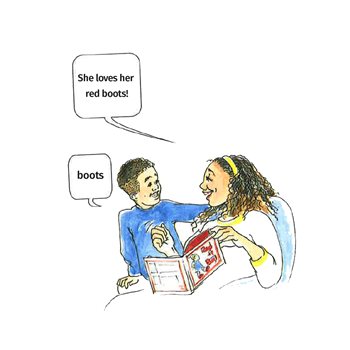Helping Verbal Children on the Autism Spectrum Grow Their Language Skills

Lauren Lowry
Hanen SLP and Clinical Staff Writer
Did you know that you and your child have a big influence on each other’s language?
A new study [1] looked at the language that typically developing children and verbal children on the autism spectrum and their parents used with each other. After studying the parents and children during six home visits over a two-year time span, the researchers found that:
These findings tell us that parents and children influence each other’s language. So, here are some things for you to think about:
- Parents naturally adjust their language level to match their child’s language level – this means that parents are tuned into their child’s abilities. What your child says affects the way you speak to them. So, if your child speaks in short sentences, you are more likely to speak in short sentences when you interact with them.
- Verbal children on the autism spectrum are paying attention to their parents’ language - what you say matters because it affects your child’s learning. Adjusting how you speak to your child and using language that is just one step ahead of how they speak is helpful because it gives your child an opportunity to hear more advanced language and reach the next step in their language learning.
How to speak so your child can learn
The key is to be just one step ahead of your child. If you use language that is too complicated or too simple, your child will find it difficult to learn from the language you use when you talk to them.
When your child sends you a message (with a word or sentence), think about what they are trying to say. Think about how they would say it if they could. Then respond with a sentence that is one step ahead of what they have said and fill in the missing words or grammar. In the More Than Words® guidebook [2], we call this “Interpreting.”
Let’s look at some examples of ways parents can respond by Interpreting that is one step ahead of their child:
- Interpret when your child says a single word
When your child uses one word, you can respond by using that word in a short, grammatical sentence.

- Interpret when your child uses a short sentence but some of the words or grammar are missing
You can respond by filling in the missing words or grammar for your child, or by turning their words into a sentence.
.aspx?width=350&height=291)

In summary, by paying close attention to the things your child says and by responding with language that is just one little step ahead of what they are saying, you will provide them with great examples of language they might use in the future. And this will help them grow in their language development.
A note about echolalia
Echolalia is language that children copy (words or sentences they have heard before). They might copy something right after they hear it (“immediate echolalia”) or they may say something a while after they hear it (“delayed echolalia”). It can be tricky to know how to Interpret when a child uses echolalia; sometimes it’s difficult to figure out what they are really trying to say, especially if the sentence is used out of context. For information about how to interpret echolalia, please see our article “Helping Children Who Use Echolalia.”
References
- Fusaroli, R., Weed, E., Fein, D., & Naigles, L. (2019). Hearing me hearing you: Reciprocal effects between child and parent language in autism and typical development. Cognition, 183, 1-18.
- Sussman, F. (2012). More Than Words®: Helping parents promote communication and social skills in children with autism spectrum disorder. Toronto, Ontario: The Hanen Centre.